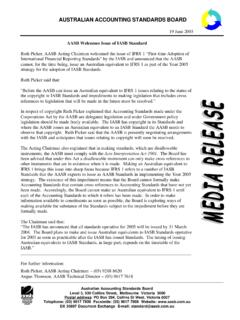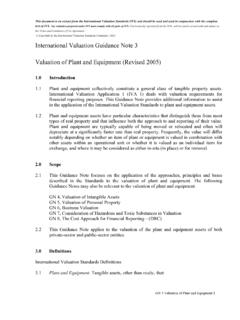Transcription of Spanish National Chart of Accounts and Consolidation Rules ...
1 Spanish National Chart of Accounts and Consolidation Rules in your PocketSeptiembre 2011 This pocket guide is aimed at facilitating rapid consultation of the Spanish National Chart of Accounts and Consolidation Rules although under no circumstances does it replace nor should it be taken as a regulatory reference in substitution of the corresponding complete legal texts .Translation of a publication entitled Plan General de Contabilidad y Normas de Consolidaci n. Gu a de bolsillo , originally issued in informationAndalusia and ExtremaduraLeopoldo and La RiojaPedro Rodrigo Pe Canary IslandsIgnacio Ram Castilla y Le nBernardo and the Balearic IslandsJaume Bux GaliciaJaime del Eastern SpainJes s Country, Navarre and AsturiasAlberto Germ n de la PracticeManuel and ServicesJuan Jos EU&TMTJes s 3In recent years we have witnessed a series of highly significant changes relating to the Spanish accounting system.
2 These changes have been a faithful reflection of the evolution and convergence of accounting standards at international level as well as the verification, by the users of financial statements, of the growing importance of accounting with respect to economic decision-taking in the highly complex environment in which we currently live: In the first phase, in 2005 it became obligatory for listed consolidated groups to issue their financial statements in accordance with international financial reporting standards (IFRSs). In the second phase, in 2007 the new Spanish National Chart of Accounts was approved, applicable not only to listed companies (separate financial statements) but also to most other Spanish companies which, in general, had not previously had significant contact with the international standards . Lastly, the most recent phase saw in 2010 the approval of Rules for the Preparation of Consolidated financial statements (NOFCAC)
3 As well as certain amendments that affected four recognition and measurement standards in the Chart of Accounts , certain of which of such importance as Standard 19 on Business Combinations and Standard 21 on Transactions between Group is no doubt that the implementation of all these changes to standards has presented a challenge and called for a significant effort, not only for the companies themselves but also for the various users of financial information, auditors, regulators, analysts and , experience has shown us that cooperation among the parties involved has without doubt been of unparalleled assistance, so much so that today we can say that the difficulties have been overcome and that as a result of the endeavours made to implement the new standards , the results achieved have been highly satisfactory. The aforementioned initial implementation and subsequent practical application have not been without difficulties which arose, among other factors, from the high degree of complexity of the new standards compared with the former Spanish National Chart of Accounts of 1990.
4 This circumstance has frequently given rise to the need to interpret and compare the accounting standards ; a process that, in any case, requires a joint effort from all the parties involved in order to achieve the desired outcome. 5We hope that this updated edition of The Spanish National Chart of Accounts and Consolidation Rules in your pocket will be of use and provide assistance during this period of changes in which we are 2011 Manuel Arranz Audit Professional Practice Director Deloitte SpainPlan General de Contabilidad 7 ContentsForeword 3 Historical context of the change in accounting legislation 11 Which Chart of Accounts can I apply? 19 Spanish National Chart of Accounts 23 Conceptual framework 24 Property, plant and equipment 27 Investment property 31 Intangible assets 32 Non-current assets and disposal groups classified as held for sale 36 Leases and other transactions of a similar nature 38 financial instruments 41 Inventories 49 Foreign currency 51 Income tax 53 Revenue from sales and services 568 Provisions and contingencies 57 Liabilities for long-term employee benefits 58 Share-based payment 60 Grants, donations and legacies received 62 Joint ventures 64 Transactions between Group companies 65 Changes in accounting policies.
5 Errors and accounting estimates 67 Events after the reporting period 68 General Rules for the preparation of financial statements 69 Statement of changes in equity 74 Statement of cash flows 75 Group companies, jointly controlled entities and associates 79 Related parties 81 9 Business combinations and Rules for the Preparation of Consolidated financial Statements (NOFCAC) 85 Business combinations 86 Rules for the Preparation of Consolidated financial Statements 91 Industry adaptations 105 Spanish National Chart of Accounts for Small and Medium-Sized Enterprises (SMEs) 109 Quick guide to most significant differences with respect to IFRSs 115 Deloitte in Spain 128 Offices 13010 11 BackgroundListed consolidated companies In 2002 the European Union (EU) approved an accounting regulation, currently in force, requiring all EU companies listed on a regulated market (and which form part of a consolidated group) to follow international financial reporting standards ( EU-IFRSs ) in their consolidated financial statements starting on 1 January 2005.
6 Unlisted companies Under the aforementioned European regulation, the Member States were able to extend the IFRS requirement to the consolidated financial statements of non-listed companies and to the separate financial statements of all companies (both listed and unlisted).In order to analyse the impact of this EU strategy on Spain, in 2001 a Commission of Experts was created to prepare a report on the situation of accounting in Spain and the basic lines along which any reform thereof should advance (Accounting White Paper).The principal recommendation contained in the aforementioned White Paper was that the accounting standards to be applied in the separate financial statements of Spanish companies should be those included in local legislation, which in order to be uniform, should be brought Historical context of the change in accounting legislation12 Historical context of the change in accounting legislationinto line with IFRSs as adopted by the European Union.
7 In addition, the experts deemed it appropriate that non-listed consolidated groups could also voluntarily apply IFRSs from 1 January 2005 onwards -an option which is still currently in inclusion of international financial reporting standards as adopted by the EU in Spanish accounting and corporate legislation came about through Law 62/2003, of 30 December, on tax, administrative, employment and social security CommissionRegulation (EC) 1606/2002/ of the European Parliament and of the Council, of 19 July 2002, on the application of international Accounting standards Adoption of IFRSs by listed consolidated groups starting 2005 Extension is envisaged, at the discretion of each Member State, to non-listed companies. 13 Historical context of the change in accounting legislationLocal regulations in Spain: Process of accounting harmonisationAccounting White Paper 2002 The Commission of Experts recommends maintaining Spanish accounting legislation for separate financial statements and adapting it to a conceptual framework and measurement bases compatible with IFRSs in order to achieve uniformity.
8 It was considered appropriate to provide the option of applying IFRSs to unlisted consolidated 62/2003, of 30 December, on tax, administrative, employment and social security measures Extends IFRSs to Spanish consolidated listed companies and introduces certain basic amendments to corporate and commercial law to make it compliant with the criteria and requirements of international standards . Allows for voluntary application of IFRSs to non-listed consolidated groups (requirement of consistent application over time and a rule of continuity). Consolidated groups: the obligation is introduced to consolidate groups under the concept of decision-making unit (Art. 42 of the Spanish Commercial Code). This obligation has since been withdrawn. Concept of fair value. New disclosures to be provided in the directors report and notes to the financial context of the change in accounting legislationReguladores locales en Espa a: Proceso de armonizaci n contableLaw 16/2007, of 4 July, reforming and adapting accounting legislation for its international harmonisation based on EU legislation The text of this corporate and commercial law Reform introduces amendments to the Spanish Commercial Code, the Consolidated Spanish Public Limited Liability Companies Law, and the Spanish Private Limited Liability Companies Law.
9 It introduces a general legal framework which will be subsequently implemented by subordinate legislation in terms of more specific technical-accounting aspects, thereby authorising: -The Spanish Government to approve through royal decree the Spanish National Chart of Accounts (SNCA) and supplementary Rules (in particular, in matters relating to Consolidation and the Chart of Accounts for SMEs). -The Ministry of Economy and Finance, at the request of the Spanish Accounting and Audit Institute (ICAC) and by Ministerial Order, to approve the industry adaptations of the new SNCA. -The ICAC to approve mandatory Rules in implementation of the SNCA, in particular in relation to measurement bases and the preparation of financial statements. The final text also includes the required amendments to the Spanish Corporation Tax Law. 15 Historical context of the change in accounting legislationReguladores locales en Espa a: Proceso de armonizaci n contableRoyal Decree 1159/2010 approving the Rules for the Preparation of Consolidated financial Statements and amending the Spanish National Chart of Accounts Implements, in the framework of the Spanish Commercial Code, the particularities of consolidating financial statements.
10 These Consolidation Rules were prepared to constitute an accounting framework in harmony with community Law. Four recognition and measurement standards (RMS) included in the SNCA were amended: - RMS 9 financial instruments - RMS 13 Income tax - RMS 19 Business combinations - RMS 21 Transactions with Group companies16 Historical context of the change in accounting legislationAccounting reform in SpainThus, the conclusions reached in the Accounting White Paper are at the root of the reform of Spanish corporate and commercial law, which took tangible form in Law 16/2007, of 4 July, reforming and adapting accounting legislation for its international harmonisation based on EU legislation, as well as in Royal Decree 1514/2007, of 16 November, approving the Spanish National Chart of Accounts , and in Royal Decree 1515/2007, of 16 November, approving the Chart of Accounts for Small and Medium-sized Companies and the specific accounting Rules for micro these accounting reforms would clearly have been incomplete had no amendments been made to the Consolidation Rules applicable to Spanish groups that do not use EU-IFRSs as the basis for issuing their consolidated financial statements.













